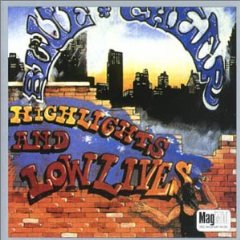| Highlights And Lowlives | ||||
|---|---|---|---|---|
 | ||||
| Studio album by | ||||
| Released | 1990 | |||
| Recorded | January–February 1990 | |||
| Studio | Foel Studio, Llanfair Caereinion, Powys, Wales | |||
| Genre | Blues rock, heavy metal, stoner rock | |||
| Length | 40:11 44:00 (Bonus track release) | |||
| Label | Thunderbolt (UK and US) Nibelung (Germany) | |||
| Producer | Jack Endino, Roland Hofmann | |||
| Blue Cheer chronology | ||||
| ||||
| Review scores | |
|---|---|
| Source | Rating |
| AllMusic | |
| Collector's Guide to Heavy Metal | 4/10 [2] |
Highlights and Lowlives is the eighth studio album by American rock band Blue Cheer, released in 1990 and produced by Jack Endino. The bonus track Blues Cadillac is on some versions/releases and can be hidden on some of the CDs.